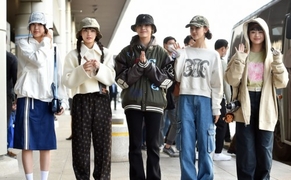By AsiaToday reporter Joo Sung-sik
While the inter-Korean summit is scheduled to take place in just over two weeks, the three countries - South Korea, the United States and Japan - will be cooperating in handling North Korea for the denuclearization of the Korean Peninsula. This seems to be aimed at reducing the gap between the parties involved in the denuclearization of the Korean Peninsula ahead of the inter-Korean summit and the North-U.S. summit talks.
National Security Office chief Chung Eui-yong, who visited the U.S. unannounced on Wednesday, met his new American counterpart John Bolton, a key official of Cheong Wa Dae said on Thursday (Apr. 12) in Seoul.
In Chung's first meeting with Bolton, who was appointed national security adviser on April 9, the two are expected to exchange views for the inter-Korean and US-North Korea summits. The two security chiefs are expected to map out a picture of North Korea's denuclearization ahead of the summits that will address this issue.
Japan's National Security Adviser Shotaro Yachi has also reportedly visited Washington the same day as Chung, emerging as a variable in the Seoul-Washington cooperation on denuclearization. However, as Japanese Prime Minister Shinzo Abe said he welcomes the inter-Korean summit and North Korea-U.S. summit on the assumption of denuclearization, there seems to be no major change in direction of the trilateral cooperation among South Korea, the United States, and Japan.
In the meantime, President Moon Jae-in made it clear that the success of the inter-Korean summit must be ensured in order to lead to a denuclearization agreement in the North-U.S. summit. At a luncheon meeting with a group of senior advisers at Cheong Wa Dae, the president said, "It will be once-in-a-life time opportunity to completely denuclearize the Korean Peninsula, establish permanent peace and move toward sustainable development of South-North Korea relations."
Stressing that the government should take a careful approach to the denuclearization agenda, the president said, "The current situation is more severe than ever before. The military tensions have risen to the highest level while South-North relations remained collapsed over the past 10 years. North Korea's nuclear and missile technologies have advanced to a point where even the U.S. feels threatened." He said that the inter-Korean relations can be solved when the denuclearization agreement is implemented not only between two Koreas, but also between the U.S. and North Korea.
"At the meeting of the preparation committee for the summit last month, the president said the two Koreas should make peaceful prosperity without interfering each other," said Im Dong-won, the honorary chairman of the Korea Peace Forum. "This is the same context as the Kim Dae-jung administration that sought to realize the real unification through peaceful coexistence of the two Koreas under its reconciliation and cooperation policy. I am very excited that the upcoming inter-Korean summit will lead to the success of the U.S.-North summit and will be able to create such situation. I am eagerly looking forward to taking this miraculous opportunity to achieve a historic transition," he added.
President Moon highlighted the importance of support from the people. "I ask the veteran advisers, who are more persuasive than any others when it comes to South-North Korean relations, to play a role in gathering the people's hearts together," he said.
#Korea #US #Japan #denuclearization #North Korea
Copyright by Asiatoday
Most Read
-
1
-
2
-
3
-
4
-
5
-
6
-
7





















